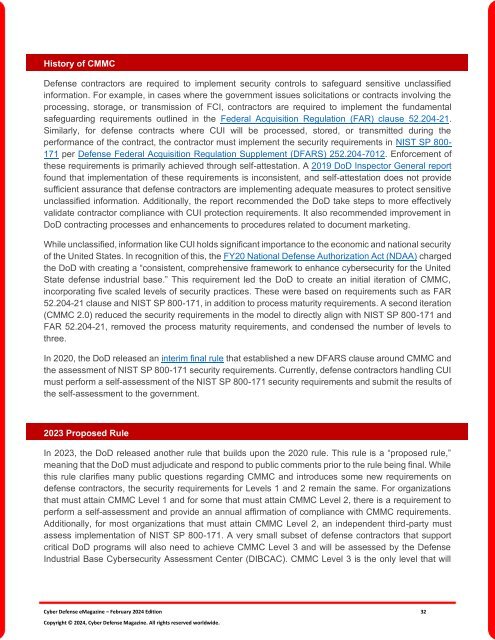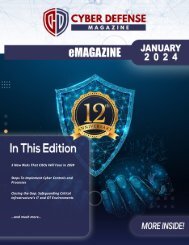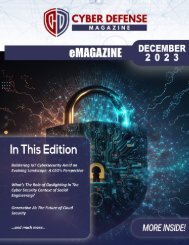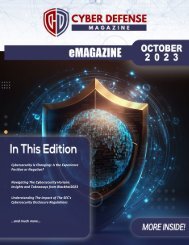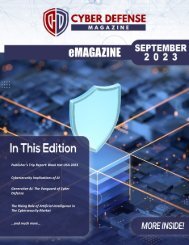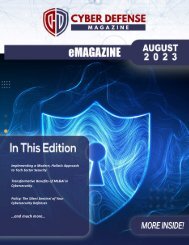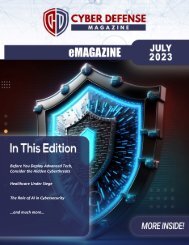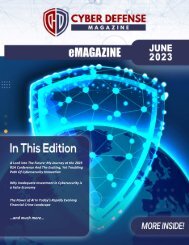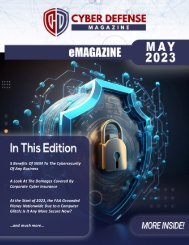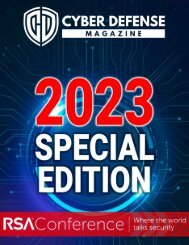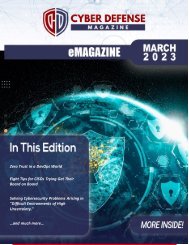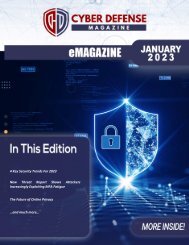The Cyber Defense eMagazine February Edition for 2024
Cyber Defense eMagazine February Edition for 2024 #CDM #CYBERDEFENSEMAG @CyberDefenseMag by @Miliefsky a world-renowned cyber security expert and the Publisher of Cyber Defense Magazine as part of the Cyber Defense Media Group as well as Yan Ross, Editor-in-Chief and many more writers, partners and supporters who make this an awesome publication! 155 page February Edition fully packed with some of our best content. Thank you all and to our readers! OSINT ROCKS! #CDM #CDMG #OSINT #CYBERSECURITY #INFOSEC #BEST #PRACTICES #TIPS #TECHNIQUES
Cyber Defense eMagazine February Edition for 2024 #CDM #CYBERDEFENSEMAG @CyberDefenseMag by @Miliefsky a world-renowned cyber security expert and the Publisher of Cyber Defense Magazine as part of the Cyber Defense Media Group as well as Yan Ross, Editor-in-Chief and many more writers, partners and supporters who make this an awesome publication! 155 page February Edition fully packed with some of our best content. Thank you all and to our readers! OSINT ROCKS! #CDM #CDMG #OSINT #CYBERSECURITY #INFOSEC #BEST #PRACTICES #TIPS #TECHNIQUES
Create successful ePaper yourself
Turn your PDF publications into a flip-book with our unique Google optimized e-Paper software.
History of CMMC<br />
<strong>Defense</strong> contractors are required to implement security controls to safeguard sensitive unclassified<br />
in<strong>for</strong>mation. For example, in cases where the government issues solicitations or contracts involving the<br />
processing, storage, or transmission of FCI, contractors are required to implement the fundamental<br />
safeguarding requirements outlined in the Federal Acquisition Regulation (FAR) clause 52.204-21.<br />
Similarly, <strong>for</strong> defense contracts where CUI will be processed, stored, or transmitted during the<br />
per<strong>for</strong>mance of the contract, the contractor must implement the security requirements in NIST SP 800-<br />
171 per <strong>Defense</strong> Federal Acquisition Regulation Supplement (DFARS) 252.204-7012. En<strong>for</strong>cement of<br />
these requirements is primarily achieved through self-attestation. A 2019 DoD Inspector General report<br />
found that implementation of these requirements is inconsistent, and self-attestation does not provide<br />
sufficient assurance that defense contractors are implementing adequate measures to protect sensitive<br />
unclassified in<strong>for</strong>mation. Additionally, the report recommended the DoD take steps to more effectively<br />
validate contractor compliance with CUI protection requirements. It also recommended improvement in<br />
DoD contracting processes and enhancements to procedures related to document marketing.<br />
While unclassified, in<strong>for</strong>mation like CUI holds significant importance to the economic and national security<br />
of the United States. In recognition of this, the FY20 National <strong>Defense</strong> Authorization Act (NDAA) charged<br />
the DoD with creating a “consistent, comprehensive framework to enhance cybersecurity <strong>for</strong> the United<br />
State defense industrial base.” This requirement led the DoD to create an initial iteration of CMMC,<br />
incorporating five scaled levels of security practices. <strong>The</strong>se were based on requirements such as FAR<br />
52.204-21 clause and NIST SP 800-171, in addition to process maturity requirements. A second iteration<br />
(CMMC 2.0) reduced the security requirements in the model to directly align with NIST SP 800-171 and<br />
FAR 52.204-21, removed the process maturity requirements, and condensed the number of levels to<br />
three.<br />
In 2020, the DoD released an interim final rule that established a new DFARS clause around CMMC and<br />
the assessment of NIST SP 800-171 security requirements. Currently, defense contractors handling CUI<br />
must per<strong>for</strong>m a self-assessment of the NIST SP 800-171 security requirements and submit the results of<br />
the self-assessment to the government.<br />
2023 Proposed Rule<br />
In 2023, the DoD released another rule that builds upon the 2020 rule. This rule is a “proposed rule,”<br />
meaning that the DoD must adjudicate and respond to public comments prior to the rule being final. While<br />
this rule clarifies many public questions regarding CMMC and introduces some new requirements on<br />
defense contractors, the security requirements <strong>for</strong> Levels 1 and 2 remain the same. For organizations<br />
that must attain CMMC Level 1 and <strong>for</strong> some that must attain CMMC Level 2, there is a requirement to<br />
per<strong>for</strong>m a self-assessment and provide an annual affirmation of compliance with CMMC requirements.<br />
Additionally, <strong>for</strong> most organizations that must attain CMMC Level 2, an independent third-party must<br />
assess implementation of NIST SP 800-171. A very small subset of defense contractors that support<br />
critical DoD programs will also need to achieve CMMC Level 3 and will be assessed by the <strong>Defense</strong><br />
Industrial Base <strong>Cyber</strong>security Assessment Center (DIBCAC). CMMC Level 3 is the only level that will<br />
<strong>Cyber</strong> <strong>Defense</strong> <strong>eMagazine</strong> – <strong>February</strong> <strong>2024</strong> <strong>Edition</strong> 32<br />
Copyright © <strong>2024</strong>, <strong>Cyber</strong> <strong>Defense</strong> Magazine. All rights reserved worldwide.


